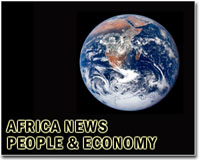| . |  |
. |
Abuja, Nigeria (UPI) Apr 26, 2011 Nigeria went ahead with state gubernatorial elections Tuesday even though hundreds of people have been killed in presidential and legislative polling in recent weeks. This time, Nigerians were voting for key political barons who control billions of dollars in oil revenues. The petrodollars are the economic lifeblood of Africa's most populous nation -- and the vast network of corruption and patronage that holds it together. The gubernatorial elections in 29 of the country's 36 states, along with some delayed legislative polling, is the final segment of the staggered voting that began April 16. The results will determine the oil-rich nation's stability amid persistent religious fighting and an insurgency in the Niger Delta, the main oil-producing zone. That violence, which began in December 2005, has slashed output by more than 1 million barrels per day, or around 40 percent of the 2.3 million bpd level back then. The insurgency, with oil production as the hostage, was aimed in large part at securing political power for the south which had long been neglected by northern powerbrokers. The violence has eased since a government-sponsored amnesty in 2009 but the threat of further disruption to oil exports remains in a country where political violence is commonplace. The presidential poll touched off a frenzy of bloodletting between northern Muslims and southern Christians in which human rights organizations say more than 500 people were killed. Nigeria's 150 million people are roughly divided equally between Christians and Muslims, who for years have been massacring each other in central and northern states. The trigger for the recent bloodletting was the victory of President Goodluck Jonathan, a southerner, in the April 16 presidential race with 57 percent of the popular vote. It was his first election as president since, as vice president, he succeeded President Umaru Yar'Adua in May 2010 after Yar'Adua, a northerner, died in office from heart problems. Under an unwritten accord among Nigeria's political bosses hashed out in the late 1990s, after a return to civilian rule after 12 years of military dictatorship, the presidency rotates between north and south every eight years, two presidential terms. That understanding "proved a pragmatic way to manage tensions resulting from the challenges of governing Africa's most populous country, which comprises some 250 ethnic groups who do not necessarily consider being Nigerian as their primary identity," the global security consultancy Stratfor observed. Jonathan took power during halfway through what was considered a northern presidential period and many northerners had demanded one of their own should have succeeded Yar'Adua, not a southerner. But he secured the support of the ruling People's Democratic Party, which has governed since the end of military rule. It incorporates disparate groups from across the country and endorsed the so-called "zoning agreement" that shared all national political offices between the political elites in the north and south. Jonathan defanged northern hotheads by agreeing to serve only one-four year term -- until 2015 -- when his vice president, a northerner and former state governor Namadi Sambo, will be the front-runner to succeed him -- providing, of course, Jonathan keeps his word. Meantime, Jonathan's victory was challenged by a key rival, former military ruler Gen. Muhammadu Buhari, whose power base is in the north. He claimed the vote had been rigged, although outside observers declared the voting generally free and fair. Buhari's defeat sparked attacks by Muslims, and retaliation by Christian hard-liners. A massive military and police presence in the turbulent regions has put the lid on the violence. But tribal and sectarian passions continue to simmer, as does the possibility of a new surge of violence in the south and the primary oil-producing states of Delta, Bayelsa and Rivers, Jonathan's home region. The governors there support Jonathan and since they ultimately have control over the militants, whom they employ as political muscle, they are expected to keep militancy in check -- and the oil flowing. "The Niger Delta has ceased to be a national pariah under Jonathan and his predecessor Yar'Adua, but Jonathan's relationships with the militants give him unique power to manage tensions in his home region and safeguard oil production," Stratfor noted. "Jonathan is in fact likely to keep militancy in the Niger Delta in check during his entire term."
Share This Article With Planet Earth
Related Links Africa News - Resources, Health, Food
 Burkina Faso president assumes defence post
Burkina Faso president assumes defence postOuagadougou (AFP) April 21, 2011 Burkina Faso President Blaise Compaore, faced with a soldiers' mutiny and violent student protests, late Thursday named himself as the country's new defence minister, decrees read on public television said. "The president (of Burkina Faso), commander in chief of the army, has assumed the function of defence and veterans minister," one of the decrees said. Compaore, a former soldier who c ... read more |
|
| The content herein, unless otherwise known to be public domain, are Copyright 1995-2010 - SpaceDaily. AFP and UPI Wire Stories are copyright Agence France-Presse and United Press International. ESA Portal Reports are copyright European Space Agency. All NASA sourced material is public domain. Additional copyrights may apply in whole or part to other bona fide parties. Advertising does not imply endorsement,agreement or approval of any opinions, statements or information provided by SpaceDaily on any Web page published or hosted by SpaceDaily. Privacy Statement |